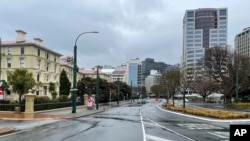New Zealand Prime Minister Jacinda Ardern announced Friday the government will ease the nationwide COVID-19 lockdown, while the nation’s largest city – the epicenter of the latest outbreak – will remain closed for two more weeks.
At a news briefing, Ardern said that beginning August 31 most of the country will move to a level-three shut down, which allows businesses to fill online orders and do takeout services. Bars and restaurants remain closed, except for takeaways.
Ardern said Auckland will remain under alert level 4, which requires all schools, offices and all businesses to be closed, with only essential services operational. Before this latest lockdown, the nation’s last stay-at-home orders were lifted in March.
The government took the measures to stop the spread of the delta variant of the coronavirus that causes COVID-19. New Zealand’s health service reported 70 new cases on Friday, bringing the total number of infections during this outbreak, which began this month, to 347. New Zealand has been one of the best nations in the world at controlling COVID-19.
Meanwhile, a new report published the medical journal The Lancet says the symptoms that linger after a person has survived the novel coronavirus are little understood by the medical community.
The report says the syndrome, known as “long haul COVID-19,” must be studied and understood in order to launch an appropriate response for what the journal calls “a modern medical challenge of the first order.”
The Lancet article said recovery can take more than a year. The lingering symptoms include “persistent fatigue, breathlessness, brain fog, and depression.”
The report says finding answers to the mystery of long haul COVID-19 “while providing compassionate and multidisciplinary care, will require the full breadth of scientific and medical ingenuity.”
Meanwhile, hundreds of thousands of people in the United States who have not been able to pay rent during the pandemic are facing eviction after the Supreme Court decided not the extend the nationwide ban on evictions that had been imposed during the pandemic.
Three of the justices dissented.
Jen Psaki, U.S. President Joe Biden’s press secretary, said in a statement, “As a result of this ruling, families will face the painful impact of evictions, and communities across the country will face greater risk of exposure to COVID-19.”





